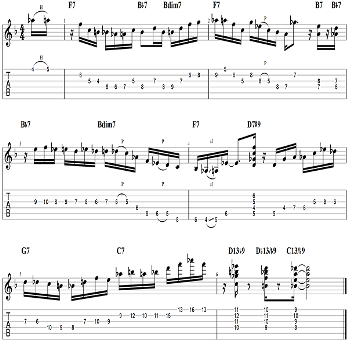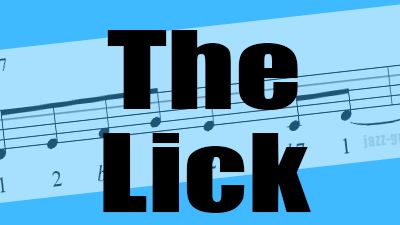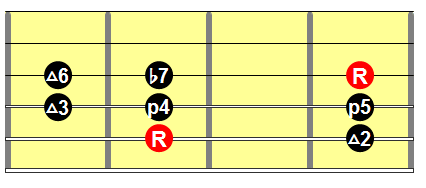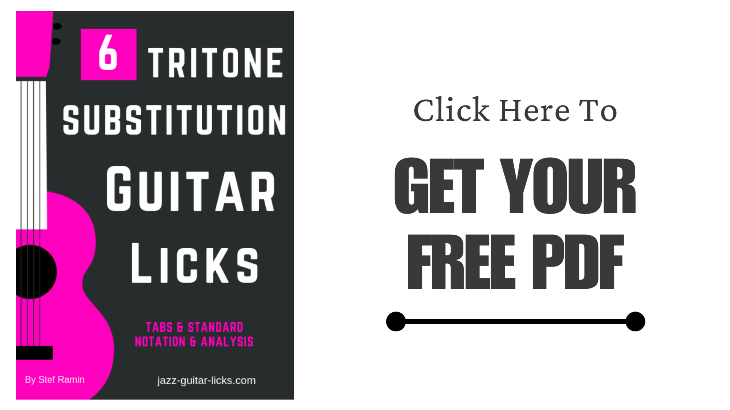jazz guitar
-
Blues For John - Matteo Mancuso - Main Theme Transcription - Free PDF
- By jazz-guitar-licks
- On 2024-05-29
- 0 comments
"Blues For John" by Matteo Mancuso is a compelling funky jazz, blues piece in F that showcases his exceptional guitar skills and deep understanding of blues music.
This lesson provides a free PDF transcription of the main theme.
-
101 Essential Jazz Guitar Albums
- By jazz-guitar-licks
- On 2023-07-16
- In Music Reviews
- 0 comments
From iconic classics to contemporary masterpieces, this comprehensive (non-exhaustive) list with the corresponding year of release shows the 101 essentials jazz albums by legendary guitarists as Bill Frisell, Django Reinhardt, Grant Green, George Benson and many others.
-
Lester Young's Solo - Guitar Transcription - Oh, Lady Be Good
- By jazz-guitar-licks
- On 2020-11-04
- In Teacher Spotlight - Jazz Guitar Lessons
- 0 comments
Lesson by Fabrizio Brusca
Oh, Lady Be Good by Lester Young is Second video from the chapter "Jazz Language And Improvisation Techniques Serie".
In this chapter, Fabrizio made a selection of some famous solos that show how jazz phrasing has been developped from 1925 until these days. Each video of the serie (organized in a chronological order) features a history of jazz masters that have contributed to the evolution of jazz.
These lines have been transposed on guitar trying to respect all the original instrument nuances and embellishments.
-
"THE LICK" - The Most Iconic Jazz Lick - Guitar Lesson With Exercises
- By jazz-guitar-licks
- On 2020-08-04
- In Jazz Guitar Lessons
- 1 comments
"The Lick" is considered as the most famous phrase in jazz music (and also in other styles).
It has been played so many times, by so many players, in so many tunes that it has become a cliche.
Although there are a significant number of common jazz lines, this one is surely the most popular, an essential part of the Bebop language.
This guitar lesson with tabs, charts and theory explains what is "The Lick", how it is built and how to apply it in different harmonic contexts.
-
Jazz up Your Blues - Guitar Lesson
- By jazz-guitar-licks
- On 2018-09-22
- In Guest Posts
- 0 comments
 One of the most daunting shifts for any guitarist can be entering the world of jazz guitar. We’ve all read essential jazz guitar books, tutorials and watched videos by those in the know and it’s a vast world full of new theoretical and practical concepts.
One of the most daunting shifts for any guitarist can be entering the world of jazz guitar. We’ve all read essential jazz guitar books, tutorials and watched videos by those in the know and it’s a vast world full of new theoretical and practical concepts.
Most guitar players get into playing through rock/blues and find jazz later on their ability spectrum. If you understand blues, you can start to make some small changes which will add a jazz dynamic to your playing. In this lesson we will cover some of those small changes you can integrate into your playing today. -
10 Jazz Blues Tunes Every Beginning Guitarist Should Know
- By jazz-guitar-licks
- On 2017-12-05
- In Jazz Guitar Lessons
- 2 comments
Building Your Jazz Blues Repertoire
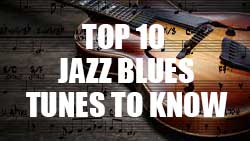 A big part of learning jazz guitar means building his own repertoire of pieces. Here is a list of 10 jazz blues songs every beginning guitarist should know.
A big part of learning jazz guitar means building his own repertoire of pieces. Here is a list of 10 jazz blues songs every beginning guitarist should know.This short list covers a range of jazz blues chord progressions and their different variations (form, tonality, Harmonic structure) with a brief analysis and also represents the most played jazz blues tunes at jam sessions.
-
12 Scales To Play Over A Dominant 7th Chord
- By jazz-guitar-licks
- On 2016-08-16
- 0 comments
Dominant chords are pivotal in many styles of music, from blues to jazz and beyond, making it essential for any guitarist to have a repertoire of scales to draw upon when improvising or crafting melodies.
Throughout this tutorial for beginners, we'll explore 12 versatile scale ideas tailored specifically for dominant chords.
